
Rutgers Welcomes the Class of 2028
This year’s incoming class was selected from the largest applicant pool in university history

Members of the incoming class have already made a difference in their hometowns, published research in scientific journals and succeeded in many other unique ways – from Rubik’s Cube competitions to the amateur boxing ring.
Some are following their family’s footsteps into careers in the medical field while others are blazing trails as the first in their families to attend college. They are starting college with the support of scholarships that put their education within reach, looking forward to finding their communities and building on their already remarkable skills.
Across the university, Rutgers is welcoming more than 14,400 first-year and transfer students this fall, according to preliminary figures.
This year’s Class of 2028 comes from the largest applicant pool in the university’s history, a fact Courtney McAnuff, the vice chancellor of enrollment management at Rutgers University-New Brunswick, credits in part to the launch of the Common Application, which simplifies the application process.
“We witnessed another record-breaking year following a record-breaking class last year,’’ McAnuff said. “This year we saw over 76,000 applicants, resulting in our highest enrolling class to date.’’
“We are looking forward to this year’s class, which represents some of the most resilient and intelligent students from all over the state, around the country, and throughout the world,” he said.
Students celebrated the start of the school year at convocation ceremonies across the university. At the Rutgers-Camden convocation, students marked the start of a new tradition – a pinning ceremony, where they exchanged color-coded school pins that symbolized their official entry into the Rutgers-Camden community. Rutgers-Newark will mark a milestone during Wednesday's convocation ceremony welcoming its largest class ever.
At Rutgers-New Brunswick, President Jonathan Holloway greeted students as they moved into the residence halls and addressed the incoming class during the convocation Friday.
This year’s incoming students are members of the most exceptional class in Rutgers history, he said.
“If we rely on SATs, ACTs, GPAs or other allegedly objective acronyms, you are the most talented first-year class we've seen," Holloway said. “If we analyze you according to your language, your race, your faith, your socio-economic background, or so many other determinants of life opportunities, you are the most diverse. You are, in a word, impressive.’’
Class of 2028 by the Numbers
Total Number of Applicants
Rutgers-New Brunswick and Rutgers Health Enrollment
Rutgers-Newark Enrollment
Rutgers-Camden Enrollment
Luke Galioto
School of Engineering
Rutgers University-New Brunswick
Luke Galioto can solve a Rubik’s Cube scramble faster than the time it takes to scramble eggs ̶̶ much faster.
He averages 12.31 seconds in competitions, according to the World Cube Association, with his fastest time of 10.27 seconds recorded at a June event in Bayside, Queens.
The 18-year-old, who comes to Rutgers majoring in material sciences and engineering, has solved nearly 2,800 Rubik’s Cube puzzles in 113 competitions.
But those numbers are for official tournaments. Since he first picked up the Rubik’s Cube nine years ago, he probably has solved thousands more puzzles.
He discovered he wanted to pursue engineering because of Rubik’s Cube.
“I was only able to find what I wanted to do – truly because of cubing,” Galioto said. “I want to spread that to other people.”
His brother Joseph introduced him to the Rubik’s Cube when they were in fourth grade. Luke is part of a triplet, the middle brother to Joseph and Paul. Joseph also will be coming to Rutgers this fall and both will be members of Rutgers Marching Band.
Galioto remembers loving the Rubik’s Cube right away. His fascination took him online, where he learned that the original 3x3 cube has 43 quintillion possible solutions. A quintillion has 18 zeros. A few months later when he was 9, he entered his first competition in September of 2015 in Norwich, Conn.
As fast as he is, Galioto, a graduate of Somerville High School, knows that there are others who are much faster solvers. But he isn’t a cuber just for the novelty of winning competitions or bragging rights of being the fastest. Galioto said he found a community in cubing – something be hopes to replicate at Rutgers.
He has never counted his collection of Rubik’s Cubes – he’s guessing he owns around 100 cubes in various shapes and sizes: there is the traditional 3x3, but also 5x5, the Megaminx, and Square-1.
He’s bringing about two dozen of his cubes to campus and plans to use them to find his cubing community in college. Galioto is aware that there is already a Rubik’s Cube Club at Rutgers, but he’s hoping it can become more active. The club is meeting Sept. 10
“Cubers at first don’t fit in because it’s a very nerdy activity,” Galioto said. “But it’s also a way for people find their community, their sense of self.”
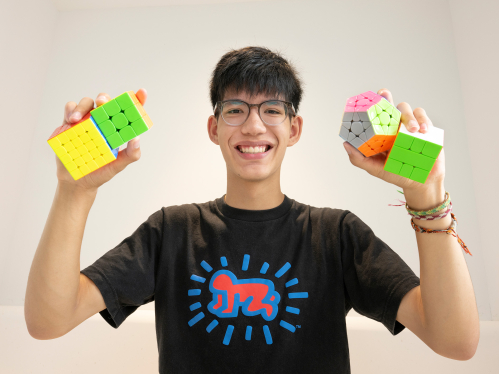
Rutgers University-New Brunswick
Rutgers-New Brunswick Honors College
School of Arts and Sciences
Even before taking her first class at Rutgers, Julia Rhodes had already had a paper published in a national scientific journal and had worked on a research project at the Rutgers Brain Health Institute.
Her initial foray into research came during her junior year at Council Rock South High School in Holland, Pennsylvania, when she designed a project to test the memory capabilities of a tiny flatworm called a planarian.
The project, for an independent research class in STEM, showed that the worms retained their ability to turn away from a red light she pointed at them with a laser, after they had been dissected and had regenerated their heads and tails.
Her study was published last February in The Journal of Emerging Investigators, which is dedicated to the research of middle and high school students. “I was very excited about that,” said Rhodes, who also won first place at the Pennsylvania Junior Academy of Science State Science Fair.
Her success led her to contact professors at Rutgers to ask if she could work on a project in one of their labs. Professor Gary Aston-Jones, director of the Rutgers Brain Health Institute, allowed her to join a study exploring whether insomnia medication could prevent addiction to prescription opioids.
During the summer of 2023, Rhodes commuted to the institute in Piscataway to give opioid injections to rats, conduct behavioral tests on them, and analyze their brain tissue.
“Julia was a diligent worker, and she helped us make progress toward our goal of uncovering novel therapies for opioid use disorder,” said Kimberly Newman, a doctoral candidate in neuroscience who mentored Rhodes.
A Rutgers Presidential Scholarship recipient, Rhodes plans to major in cognitive science at Rutgers and hopes to continue her research on the brain. “I want to join a lab and keep pursuing that kind of work,” she said. “It’s really exciting that I got to start before going to college.”
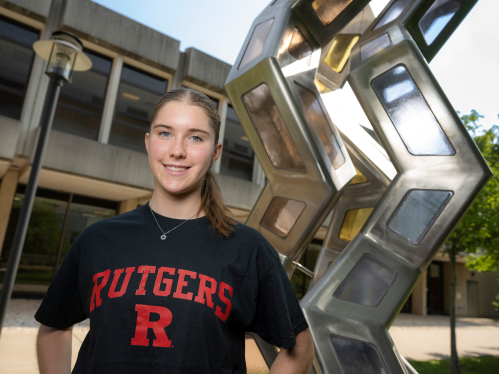
Triumphant Ayodele
Rutgers School of Nursing
Rutgers Health
Growing up in Nigeria and then New Jersey, Triumphant Ayodele would hear stories from his mother about her dreams of becoming a nurse.
She would tell him about the heroism of nursing, of saving lives and helping others in their most vulnerable time of need.
Ayodele’s mom, Aderonke, who works as a home health aide, never had the opportunity to go to college to become a registered nurse. But her stories stuck with him, and Ayodele is now pursuing the career his mother couldn’t have, entering the School of Nursing in Newark this fall. He is following his older sister, Comfort, to Rutgers. She’s studying mechanical engineering at School of Engineering in New Brunswick.
“My mom, she’s my biggest supporter,” said Ayodele, who will be 18 this month. “She gives me the motivation and support that I need.”
Ayodele comes to Rutgers on the Evelyn Margulies Yudowitz Endowed Scholarship, which means that if he maintains the required GPA all four years, tuition and fees for his undergraduate degree in nursing will be covered. Yudowitz established the scholarship in 2022 to address nursing shortages, which had been particularly dire in Newark after the COVID-19 pandemic. The scholarship program gives priority to first-generation nursing students who graduate from Yudowitz’s alma mater, Weequahic High School in Newark.
“It will provide me with the financial support needed to alleviate the burden of tuition and other expenses, allowing me to focus more on my studies and less on financial worries,” Ayodele wrote in his essay application.
He learned he had received the scholarship during his graduation ceremony in June with a surprise announcement by Kyle D. Warren, senior vice dean, Rutgers School of Nursing, and associate vice chancellor for student affairs, Rutgers Health
“As a first-generation student, the significance of this scholarship extends far beyond the monetary value,” Ayodele wrote in his essay. “It symbolizes breaking barriers and defying odds, showing that with dedication and perseverance, anything is achievable. Growing up, I witnessed the struggles my family faced, especially when it came to accessing higher education.”
His mom’s adoration for the profession put him on the path to nursing, but Ayodele said he always had an instinct to take care of others. He was the kid who watched his younger cousins at family gatherings or the middle-schooler who wanted to ensure his classmates stayed safe during COVID-19.
“Helping someone – it’s the best feeling ever,” he said.
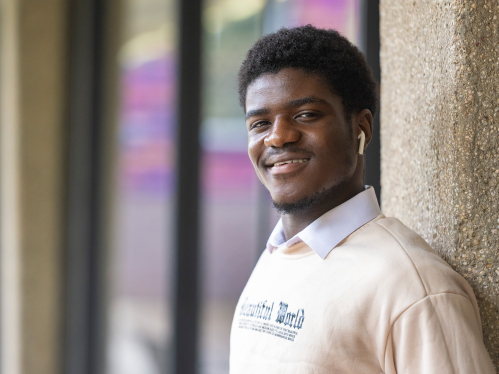



First-Generation Students
African American, Latino and Asian Students
Most miles traveled (from Victoria, Australia) to attend Rutgers
Ishir Hazarika
School of Environmental and Biological Sciences
Rutgers University-New Brunswick Honors College
When it rains in Ishir Hazarika’s hometown of Berkeley Heights, streets turn into fast-moving rivers. Water gushes out of manholes and toilets in basements overflow.
In the summer of 2023, Hazarika created a video that showed the devastating effects of flooding in the township as an intern for the mayor’s office. After town officials showed the video to their Congressional representatives in Washington, Berkeley Heights received $2 million to upgrade the municipal sewer system.
“I don’t want to toot my own horn,” Hazarika says, “but I think some of the work that I did definitely helped out.”
Hazarika’s interest in the environment began when he was six years old and visiting India, his parents’ native country. Each summer, his family would drive to Kaziranga National Park, a breeding ground for elephants, rhinoceroses, tigers and other wildlife.
As he grew older, Hazarika noticed that the park was deteriorating. So in his junior year of high school, he created a nonprofit called the Tree Alliance, which raised more than $2,500 to help restore the park’s natural habitat.
The nonprofit also held a series of workshops in Berkeley Heights to promote tree planting, since the township had received a grant to fund more trees but few residents had taken advantage of it.
“I realized that with the Tree Alliance, I could not only educate people about what’s happening in Kaziranga National Park in India, but also about environmental issues overall,” he says.
While interning for the mayor’s office last summer, Hazarika also worked on a research project on solar and wind energy in India with a professor at Baruch College in New York. After graduating from Rutgers, Hazarika, a Presidential Scholarship recipient, hopes to help companies transition to more sustainable business practices.
“I want to find a way to bridge the gap for companies that want to become more environmentally conscious but don’t want to hurt their profit margins,” he says.
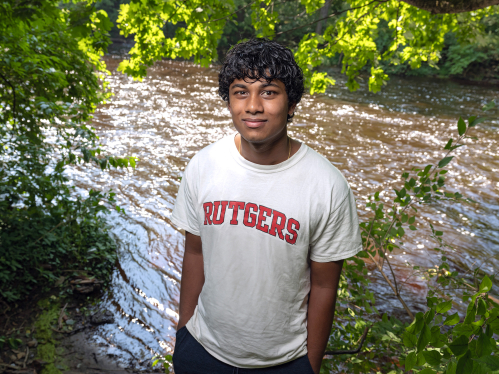
Deborah Odekunle
Rutgers University-Newark Honors Program
School of Arts and Sciences-Newark
By the time Deborah Odekunle graduates from the BA/MD program at Rutgers-Newark, everyone in her immediate family will be a doctor.
Her parents, who earned their medical degrees in Nigeria, now practice in New Jersey and New York. Her oldest brother, Emmanuel, is in his third year at Rutgers New Jersey Medical School, and her middle brother, David, will get his MD after graduating from college next year.
“I wouldn’t say that our parents pressured us or anything,” Odekunle says. “It’s more about our exposure to the medical field and we’ve seen how they’ve impacted many lives, and we want to do that too.”
What also sparked her interest in medicine was seeing how health care workers tirelessly saved lives during the pandemic. After spending her freshman year at Bloomfield High School in lockdown, Odekunle started volunteering at Hackensack Meridian Hospital, where she found that she could brighten a patient’s day.
“Volunteering really solidified my decision to pursue something in the medical field as a way for me to give back to my community,” she says.
When she was 6 years old, Odekunle and her family left Nigeria and moved to the United States because her parents wanted to provide a better education for their children. In high school, she took advantage of every activity she could and was president of the National Honor Society, the math club, and the mock trial club, while also serving as the track and field captain.
A Rutgers Presidential and Chancellor Scholarship recipient, Odekunle will major in biology and complete her undergraduate education in three years before attending Rutgers New Jersey Medical School.
“I thought it was the best program that would give me the opportunities that I wanted, the research programs, the supportive faculty and the ability to be very effective in what I want to do,” she says.
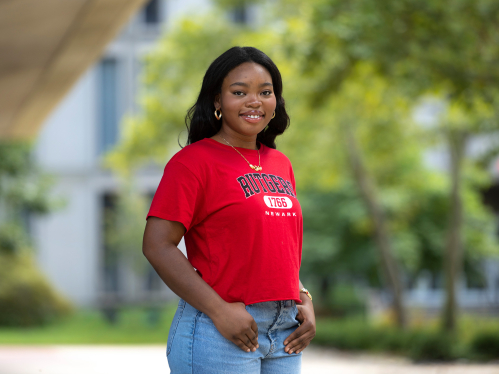


Out-of-State Students
Countries Represented
U.S. States Represented
Erdogan Rencber
School of Business-Camden
Rutgers-Camden
Erdogan Rencber’s journey to Rutgers began halfway around the world.
He was born into a Turkish family, grew up in Kazakhstan, and transferred from California State University, Northridge, to Rutgers-Camden.
He has no connections in New Jersey, but settled here because he was looking for a good business school in a mid-size city with proximity to New York’s financial district. He also liked that Rutgers-Camden has a smaller student population because he says it would be easier for him to find and make friends.
Rencber, who will turn 20 next month, has been boxing since he was 12. In 2022 when he was 17, he was named one of Kazakhstan’s amateur boxing champs.
“I fell in love with the sport after my parents showed me Rocky,” he said. “Then I was really inspired by the boxer Floyd Mayweather. I really liked his style. I started boxing and was successful in it.”
With the amateur title under his belt, Rencber came to the United States with aspirations of becoming a pro. He lived and trained in Los Angeles while studying at CSU-Northridge. But a shoulder injury sidelined his plans and ended a potential career as a professional boxer.
He decided to change course and major in business after excelling at his studies in California. This fall, he started classes at Rutgers School of Business-Camden.
“My parents think I’ve made the right decision by changing my professional goal and deciding to level up my studies,” said Rencber, adding that after he graduates from Rutgers in two years, he’s planning to pursue his master’s degree.
He still boxes for fitness and continues to be a fan of all the movies in the Rocky franchise. On his to-do list is finding a gym near the Camden campus. Next, he plans to run up the stairs of the Philadelphia Museum of Art, as Rocky famously did.
“Yup, up the stairs, every morning!” he said.
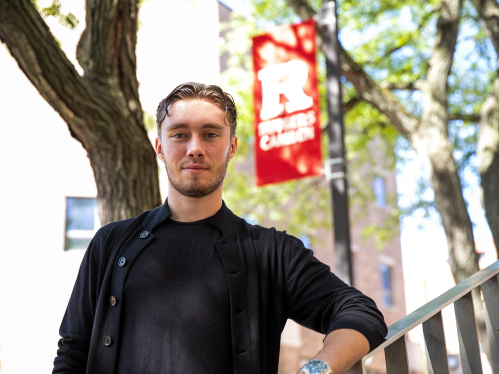
Seraphina Taylor
Mason Gross School of the Arts
Rutgers-New Brunswick
Seraphina Taylor is at Mason Gross School of the Arts to study jazz piano and become the type of instructor she wished she had when she began learning to play.
“I know for sure that I want to teach, especially having seen the way other teachers in the past have failed me,” said Taylor, a 2023 graduate of Academy of Performing Arts, Scotch Plains.
Taylor, 19 of Elizabeth, N.J., was introduced to the piano at her great-grandmother's house, where an old out-of-tune upright would sit unused. She was always the one in the family playing the instrument, the same one her aunt took her lessons on, but had long abandoned.
“There aren’t many musicians in my family, but I kind of took to it,” Taylor said. “I would play songs that I liked, and my mom noticed I had a good ear for it.”
She signed up the then-8-year-old Taylor for weekly Saturday lessons with the neighborhood piano instructor. That teacher’s strict, by-the book approach of teaching the classical repertoire didn’t mesh with Taylor’s learning style. The lessons felt stifling, she said.
Taylor remembers when the music of pianist Thelonious Monk made its way to her Spotify “recommended-for-you” playlist. She was already listening to the likes of Bernard Wright and Don Blackman, but Monk was at another level. When Taylor wanted to audition for a youth jazz program and sought her piano teacher's help to prepare, the teacher had no interest in jazz instruction.
Jazz brings her joy. She described the feeling in her application essay to Mason Gross: “My head was buzzing, and my eyes welled with tears. It felt like my brain had burst into glitter.”
Once the pandemic hit and Taylor entered high school, she stopped going to her lessons. Then about a year into pandemic, Kiefer, a musician she admired, was offering private lessons over Zoom. She jumped at the opportunity and started taking lessons. She was rusty and, in some ways, she had to start anew, but those lessons, under the tutelage of the right teacher, brought her back to the instrument.
Around the same time, a friend told her about Keys 2 Success, a non-profit that brings music education to children in underserved communities of Newark, that was recruiting instructors.
She started working there as a teenager and recalls her first student, a talkative and energetic 8-year-old girl who seemed to be interested in everything but the piano. Taylor learned that her student’s favorite singer was Ava Max. Taylor found an arrangement of one of Max’s songs, which she used to teach her new student. It worked. Taylor said the student was thrilled and continued showing up for her lessons.
Taylor is considering studying music education along with jazz so she can teach fulltime after graduation. She wants to also perform someday, but for now she's focusing on learning.
“My experiences have made me a better teacher for the kids I’ve been teaching,” Taylor said. “I’ve been able to see them grow as people. I don’t expect any of these kids to become pianists. That’s not what I aim for. It’s more about teaching them discipline and teaching them how to build community, overcome obstacles, and pursue things they want to pursue through the piano.”
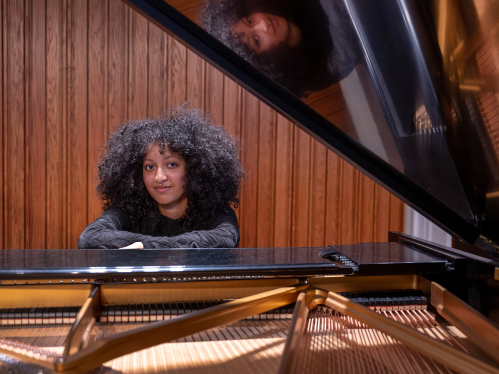


We are excited to have our students back! Check out highlights from back-to-school across the university:
By Roya Rafei, Sherrie Negrea and Andrea Alexander
Photography by Nick Romanenko and Ronald Downes Jr.
For media inquiries contact Dory Devlin at dory.devlin@rutgers.edu
Published Tuesday, Sept. 3, 2024